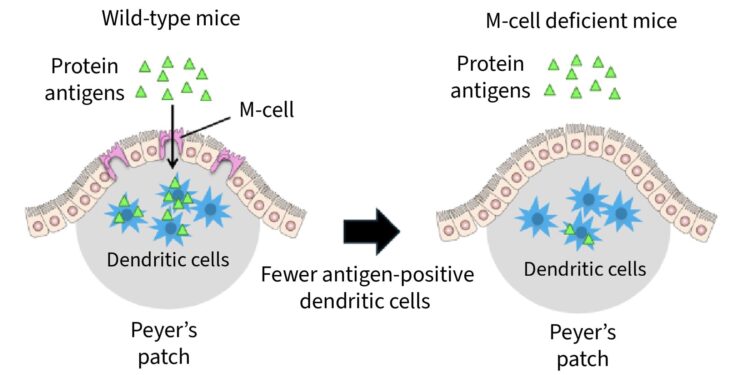When protein antigens are injected into the small intestine of wild-type mice, they are delivered to dendritic cells in Peyer’s patches. Similar experiments in M-cell-deficient mice showed that fewer dendritic cells received the protein antigen. Credit: RIKEN
Researchers led by Hiroshi Ohno at the RIKEN Center for Integrative Medical Sciences (IMS) in Japan have discovered that dietary antigens like milk proteins help prevent tumors from growing in our gut, particularly in the small intestine. Experiments reveal how these proteins trigger the intestinal immune system, allowing it to effectively stop new tumors from forming. The study was published in the scientific journal Frontiers in immunology September 17th.
Food antigens are often frowned upon because they cause allergic reactions to foods such as peanuts, shellfish, bread, eggs, and milk. Even when they don’t cause allergic reactions, these antigens, along with the many others found in plants and beans, are still considered foreign bodies that must be investigated by the immune system.
Ohno and his team have previously reported that food antigens activate immune cells in the small intestine, but not in the large intestine. Meanwhile, some immune cells activated by gut bacteria are known to suppress tumors in the intestine.
In the new study, RIKEN IMS researchers brought these two lines of thinking together and tested whether dietary antigens suppress tumors in the small intestine.
The team started with a particular type of mouse that had a mutation in a tumor suppressor gene. As in people with familial adenomatous polyposis, when this gene malfunctions, the mice develop tumors in the small and large intestines.
The first experiment was quite simple. They gave these mice either normal food or food without the antigen and found that those given normal food had fewer tumors in the small intestine, but the same amount in the large intestine.
Then they added a common representative antigen called albumin, which is found in meat and not in normal foods, to the antigen-free diet, making sure that the total amount of protein was equal to the amount of protein in the normal diet.
When the mice were fed this diet, the tumors in the small intestine were suppressed, just as they had been when fed a normal diet. This means that the tumor suppression was directly related to the presence of antigens, not to the nutritional value of the food or to a specific antigen.
All three diets also had effects on immune cells, particularly T cells, in the small intestine. Mice that received the antigen-free diet had significantly fewer T cells than those that received the regular chow or the antigen-free chow with milk protein. Further experiments revealed the biological process that makes this possible.
These findings have clinical implications. Like antigen-free diets, elemental clinical diets include simple amino acids but no protein. This reduces digestive workload and may help people with serious gastrointestinal disorders, such as Crohn’s disease or irritable bowel syndrome.
According to Ohno, “Small bowel tumors are much rarer than colon tumors, but the risk is higher in cases of familial adenomatous polyposis, and therefore the clinical use of elemental diets to treat inflammatory bowel disease or other gastrointestinal conditions in these patients should be approached with great caution.”
Simple diets are sometimes adopted by people without serious gastrointestinal disorders or allergies as a healthy way to lose weight or reduce bloating and inflammation. The new findings suggest this could be risky and stress that this type of diet should not be used without a doctor’s advice.
More information:
Takaharu Sasaki et al, Dietary antigens suppress small intestinal tumorigenesis, Frontiers in immunology (2024). DOI: 10.3389/fimmu.2024.1373766
Quote: Scientists Find Proteins in Meat, Milk, Other Foods Suppress Intestinal Tumors (2024, September 18) Retrieved September 18, 2024, from
This document is subject to copyright. Apart from any fair dealing for the purpose of private study or research, no part may be reproduced without written permission. The content is provided for informational purposes only.



